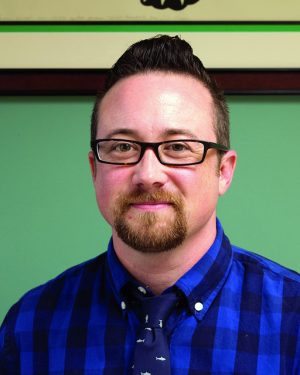Diversity center plans fresh start under new director
Editor’s note: justin adkins spells his name entirely in lowercase, and we have preserved this spelling.
The Inclusion, Diversity, Equity, Access and Social Justice Center underwent personnel changes during the summer of 2016, hiring both a new director and an associate director.
The office, formerly known as the Center for Intercultural Advancement and Student Success, is now led by justin adkins, director of the IDEAS Center and associate dean of students, and Associate Director Darnell Epps.
Ron Cole, provost and dean of Allegheny College, said the summer hirings of adkins and Epps reflect the college’s commitment to its mission statement.

“I think that’s where this [the changes to the IDEAS Center] is coming from: a recognition of growing, advancing the mission [and] growing the mission of that office,” Cole said.
Dean of Students Kimberly Ferguson said the name change reflected a re-thinking of the purpose of the center.
“We wanted to focus more on the bigger picture of what that office would do,” said Ferguson.
Ferguson also said the IDEAS Center’s previous name was redundant.
“Isn’t everybody in charge of student success?” Ferguson said.
While the office underwent personnel changes over the summer, Epps said its main goal has not changed.
“We still have a commitment to serving systematically underrepresented or underserved populations,” Epps said. “That’s still at the core of what we do.”
In addition to underrepresented populations such as people of color, women and LGBTQ students, adkins said he will work with the entire student body.
“To be able to make sure that all students are supported, we have to engage all students,” adkins said.
He also said he will encourage all students to collaborate to resolve the issues underrepresented students face.
“I look to this idea that for anyone to be free, we all have to be free, and that we all have to work together for our collective freedom,” adkins said.
Epps agreed, saying the office will also encourage collaboration between student diversity groups, such as the Advancement for Black Culture and the Gender and Sexuality Alliance, and general student organizations.
“It seems utopian, but it makes sense,” Epps said. “We’re a small school—we need to collaborate.”
Cole said the IDEAS Center has previously had an impact on students at Allegheny, but its future will provide more support for students.
“There has been incredible work done in that office over its history,” Cole said. “I think what we’re doing—the new IDEAS Center—is being shaped in concert with growing differences in our society.”
According to adkins, the office’s commitment to underrepresented populations will expand to include first generation and low-income students.
The IDEAS Center will begin programs to foster discussions on diversity, including a media viewing program each Wednesday.
“There’s some really awesome television programming that’s happening right now around diversity and inclusion, and TV programs that just haven’t existed for the longest time, where people of color are the main, central characters and stuff like that,” adkins said.
Epps said media such as television and movies can have an impact on how Allegheny students view the mission of the office.
“I’m a big believer in how the arts can not only entertain, but they can educate,” Epps said.
The office plans more activities and programs, including a lecture series, with one speaker each on the topics of inclusivity, diversity, equity, access and social justice, according to adkins. Another program the office will sponsor is using two garden beds outside of the campus center to advance the center’s mission.
“The idea is for students to really bring to us things that they’re really interested in growing that tie into their cultural traditions, and looking at food as part of climate justice,” adkins said.
adkins said he is in the process of setting up a program for Allegheny students and members of the Meadville community who are LGBTQ-identified to discuss issues facing that community. The office’s space in the Gateway will also host programs every day of the week, adkins said.
Another change adkins brings to the IDEAS Center is the inclusion of a student in the office to collect information about the history of diversity at Allegheny and present it during the college’s annual Reunion Weekend.
“Support that students are asking for, initiatives students are asking for, a lot of times there are things that have been asked for before,” adkins said. “Often it wasn’t that they were purposefully ignored or anything. Maybe it wasn’t the right time, and now we’re at the right time. But we have to know about those things before we can move forward.”
While adkins is optimistic for his role as the director of the IDEAS Center, he admits the office has had a problem retaining directors.
“It’s going to take time to build trust with students, because I know it’s hard for students…to trust that I’m going to stay and that the work we’re initiating this year is not just going to be like the work that was initiated the last four years or whatever,” adkins said.
Cole said previous directors may have seen the position as a “stepping stone” in higher education.
“I’d be surprised if we ever had anyone in that office who made a career out of it. That would be unique,” Cole said. “But I certainly hope, very strongly, that we have stability in those positions for multiple years.”
The transition to the IDEAS Center has had an impact on student activity in the office, according to Ferguson.
“I’ve been here since February, and I see so much more traffic in that space,” Ferguson said.
Cole said the office’s new directors have an “incredible energy” that will positively impact the office’s success.
“I’m thrilled and really excited for the work being done by justin and Darnell,” Cole said. “[I’m] absolutely looking forward to what they’re going to bring.”







